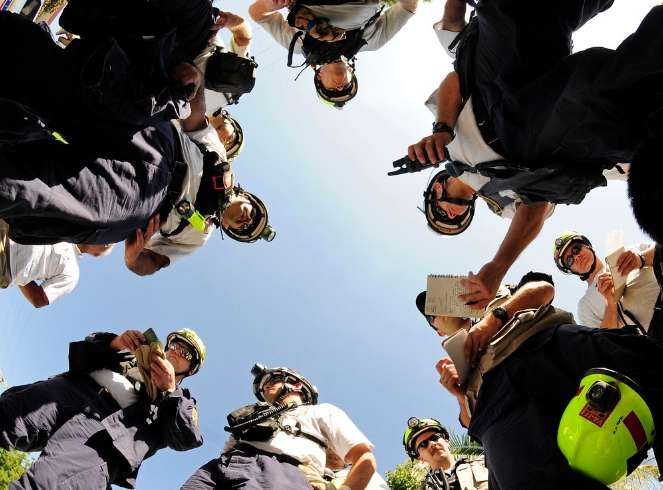Criminal Gangs in Haiti Target Journalists to Suppress Reporting on the Nation’s Crisis.
A Grim Reminder of the Perils Faced by Journalists in Haiti’s Gang-Ridden Landscape
The recent brutal attack on journalists in Haiti, resulting in the death of two reporters and injuries to several others, serves as a stark reminder of the dangerous conditions under which journalists operate in the violence-plagued nation. The incident unfolded during the reopening of Haiti’s largest public hospital in Port-au-Prince, a ceremony meant to signify a step towards normalcy in a country reeling from escalating gang violence and political instability. Instead, it became a scene of terror when armed men opened fire on reporters covering the event. Among the victims were Marckendy Natoux, a journalist affiliated with Voice of America (VOA) and various local outlets, and Jimmy Jean, who reported for the online platform Moun Afe Bon. The attack, claimed by the Viv Ansanm gang coalition, underscores the vulnerability of journalists in a country where gangs hold significant power and often target those who dare to report on their activities.
The deliberate targeting of journalists is not an isolated incident in Haiti. The country has a grim history of violence against media personnel, often committed with impunity. The Committee to Protect Journalists (CPJ) has documented seven targeted journalist killings in Haiti over the past decade, with none of the cases being resolved. This chilling statistic places Haiti at the top of the CPJ’s 2024 Global Impunity Index, a stark indictment of the failure to protect journalists and hold perpetrators accountable. The unchecked violence, coupled with the prevailing political instability and the pervasiveness of gang activity, creates a perilous environment for journalists who strive to inform the public about the unfolding crisis. The attack highlights not only the immediate danger faced by journalists but also the broader implications for freedom of the press and access to information in a country desperately needing both.
The incident has drawn condemnation from international organizations, including the CPJ, which called for a thorough investigation and justice for the victims. Haitian officials also denounced the attack, labeling it an assault on the foundations of society. However, words of condemnation alone are insufficient to address the systemic issues that have allowed such violence to flourish. The government’s response must go beyond rhetoric and translate into concrete actions to protect journalists and dismantle the powerful gang networks that terrorize the population. The dismissal of the health minister, who organized the hospital reopening ceremony without adequate security arrangements, is a start, but it is merely a reactive measure and does not address the underlying problem of rampant gang violence.
The attack on journalists comes at a particularly precarious time for Haiti. The country has been grappling with a surge in gang-related violence since the assassination of President Jovenel Moïse in 2021. According to the United Nations, over 5,300 people have been killed and more than 2,100 injured in gang-related violence in 2024 alone. These staggering figures paint a bleak picture of a nation in crisis, where gangs operate with near impunity and the rule of law is increasingly eroded. The presence of 400 armed Kenyan police officers, deployed as part of a multinational security support mission, has done little to curb the violence, highlighting the complexities of the security situation and the limitations of external interventions. The lack of security and the prevailing climate of fear not only endanger journalists but also hinder humanitarian efforts and impede the country’s path towards stability and recovery.
The case of Haiti underscores the critical role of a free press in holding power to account and informing the public during times of crisis. When journalists are targeted and silenced, the flow of information is stifled, and the space for democratic discourse shrinks. This creates a vacuum where misinformation and propaganda can thrive, further exacerbating the existing challenges. The international community must recognize the urgency of the situation and support initiatives aimed at strengthening press freedom and protecting journalists in Haiti. This includes providing training and resources for journalists, advocating for legal reforms to protect media workers, and supporting independent media outlets that play a vital role in disseminating accurate and unbiased information.
The tragic deaths of Marckendy Natoux and Jimmy Jean serve as a somber reminder of the courage and dedication of journalists who risk their lives to report from conflict zones and volatile environments. Their sacrifice underscores the importance of protecting journalists and upholding press freedom as essential pillars of a functioning democracy. The international community must stand in solidarity with Haitian journalists and work collaboratively with local authorities to create a safe and enabling environment where journalists can carry out their vital work without fear of reprisal. The future of Haiti hinges on its ability to address the root causes of violence and instability, and a free and independent press is crucial to this process. The killings of these journalists should serve as a wake-up call for decisive action to protect the press and ensure that those responsible for these heinous acts are brought to justice.
Share this content:












Post Comment